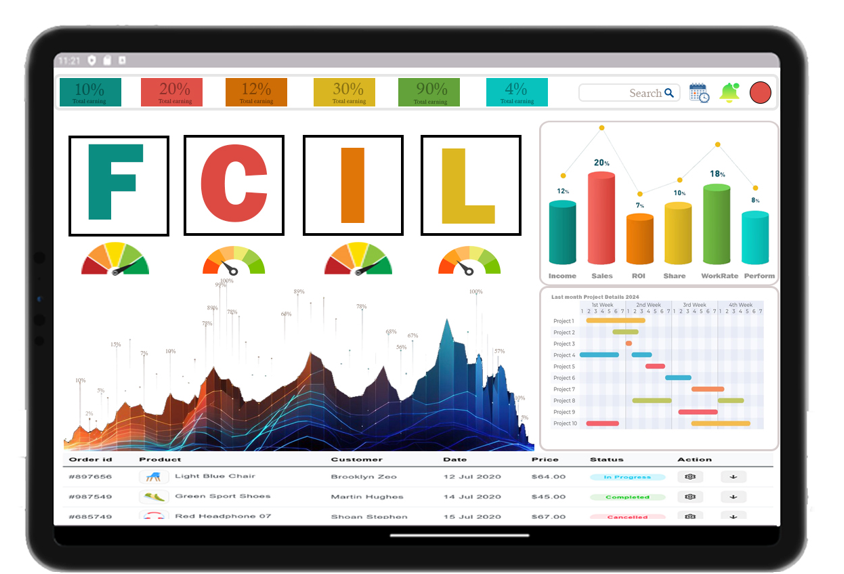AI-Powered Balanced Scorecard Software: Revolutionizing Strategic Management
In today’s dynamic business environment, organizations are constantly seeking innovative tools to enhance strategic planning and performance management. The Balanced Scorecard (BSC), a performance measurement framework that combines financial and non-financial metrics, has been a staple in strategic management for decades. However, the integration of Artificial Intelligence (AI) into Balanced Scorecard software is now transforming how organizations set, monitor, and achieve their strategic objectives. This article provides an overview of AI-powered Balanced Scorecard software, highlighting its benefits, key features, and impact on strategic management processes.

Understanding the Balanced Scorecard Framework
The Balanced Scorecard, developed by Robert Kaplan and David Norton in the early 1990s, is a strategic planning and management system that organizations use to:
- Align business activities with the vision and strategy of the organization.
- Improve internal and external communications.
- Monitor organizational performance against strategic goals.
The BSC framework goes beyond traditional financial metrics, incorporating four key perspectives to provide a more comprehensive view of organizational performance:
- Financial Perspective: Focuses on financial objectives and performance, such as revenue growth, cost reduction, and profitability.
- Customer Perspective: Evaluates customer satisfaction and retention, market share, and brand strength.
- Internal Process Perspective: Assesses the efficiency and effectiveness of internal processes, such as production, delivery, and quality control.
- Learning and Growth Perspective: Measures organizational learning, innovation, employee training, and development.
The Role of AI in Enhancing the Balanced Scorecard
AI-powered Balanced Scorecard software leverages advanced technologies like machine learning, natural language processing, and predictive analytics to enhance the traditional BSC framework. This integration offers several key benefits:
- Data-Driven Decision-Making: AI algorithms can analyze large volumes of data from multiple sources, providing deeper insights into organizational performance. By identifying patterns and trends, AI helps organizations make more informed strategic decisions.
- Real-Time Performance Monitoring: Traditional Balanced Scorecards rely on periodic data collection and reporting, which can delay decision-making. AI-powered software enables real-time monitoring of key performance indicators (KPIs), allowing managers to respond swiftly to changes in the business environment.
- Predictive Analytics: AI can forecast future performance based on historical data and current trends. This capability helps organizations anticipate challenges and opportunities, enhancing proactive decision-making and strategic planning.
- Automated Reporting and Alerts: AI-powered software can automate routine tasks such as data collection, analysis, and reporting. It can also send real-time alerts when performance deviates from set targets, enabling timely corrective actions.
- Enhanced Employee Engagement: By providing personalized insights and recommendations, AI-powered Balanced Scorecard software fosters a culture of continuous improvement and engagement among employees.
Key Features of AI-Powered Balanced Scorecard Software
To effectively support strategic management, AI-powered Balanced Scorecard software includes several advanced features:
- Integrated Data Management: The software integrates data from various internal and external sources, including ERP systems, CRM platforms, social media, and market research databases. This holistic approach ensures a comprehensive analysis of organizational performance.
- AI-Driven Analytics: Machine learning algorithms process and analyze large datasets to identify correlations, trends, and anomalies that might be missed by traditional analysis methods.
- Customizable Dashboards and Reports: The software provides customizable dashboards and reports that present key metrics and insights in a user-friendly format. Users can tailor these visualizations to their specific needs, ensuring that they have access to the most relevant information.
- Natural Language Processing (NLP): NLP capabilities allow the software to interpret and analyze unstructured data, such as customer feedback, employee comments, and social media posts. This feature provides a more nuanced understanding of stakeholder sentiment and behavior.
- Predictive and Prescriptive Analytics: Beyond forecasting future performance, AI-powered software can also provide prescriptive analytics, offering actionable recommendations to optimize performance.
- Automated KPI Management: The software can automatically update KPIs based on real-time data, reducing the administrative burden on managers and ensuring that performance metrics are always up to date.
Impact on Strategic Management Processes
The integration of AI into Balanced Scorecard software significantly enhances strategic management processes in several ways:
- Strategic Alignment: AI-powered software helps organizations align their activities with strategic goals more effectively by providing data-driven insights and real-time feedback. This alignment ensures that all departments and teams are working towards the same objectives.
- Improved Agility: With real-time data and predictive analytics, organizations can quickly adapt their strategies to changing market conditions and emerging trends. This agility is crucial in today’s fast-paced business environment, where the ability to respond swiftly to new opportunities and threats is a key competitive advantage.
- Enhanced Accountability: The software provides transparency into performance at all levels of the organization, fostering a culture of accountability. By clearly linking individual and team performance to strategic objectives, AI-powered Balanced Scorecard software ensures that everyone understands their role in achieving organizational goals.
- Continuous Improvement: AI-powered Balanced Scorecard software encourages continuous improvement by providing ongoing feedback and recommendations. This approach helps organizations refine their strategies and processes over time, leading to sustained performance improvements.
Conclusion
AI-powered Balanced Scorecard software represents a significant advancement in strategic management tools. By combining the proven benefits of the Balanced Scorecard framework with the capabilities of AI, organizations can gain deeper insights, improve decision-making, and achieve better alignment with their strategic goals. As businesses continue to navigate an increasingly complex and competitive landscape, AI-powered Balanced Scorecard software will play a critical role in driving sustainable growth and success.